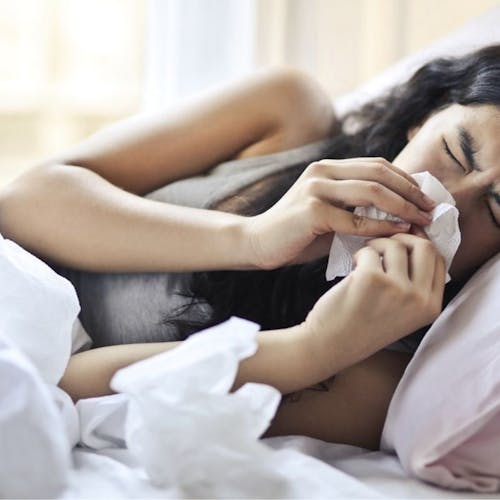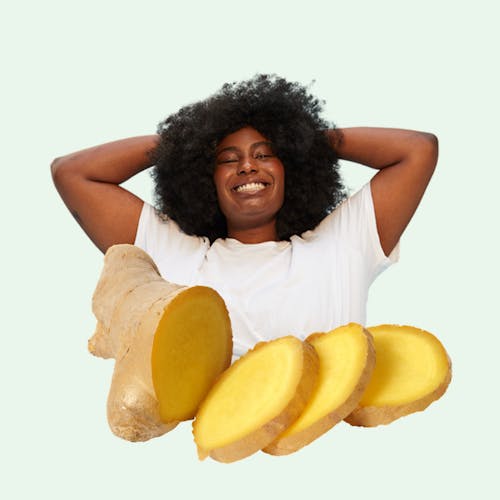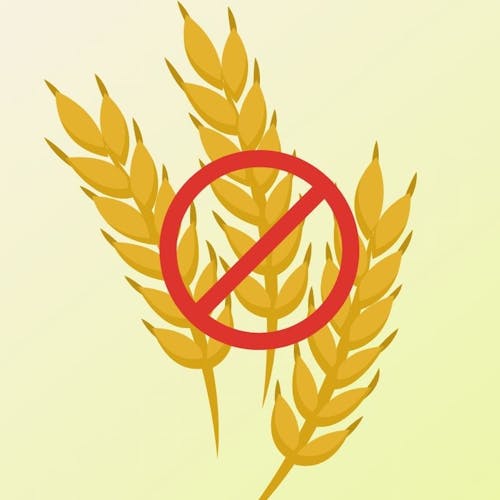This website uses cookies to enhance the user experience. By using Yoppie you are agreeing to our use of cookies.
PMS Nausea: Feeling Sick Before Your Period?
Written by Yoppie
13 Dec 2021
Nausea is a PMS symptom??
How does nausea happen during PMS?
Is PMS nausea anything to worry about?
How do I get rid of PMS nausea?
Could I be pregnant?
Feeling like you’re about to vom? You’re not the only one. It’s not commonly mentioned as a symptom of PMS, but nausea can come over many people in the days leading up to their period. We’re looking at why it happens, and how you can manage it so it doesn’t affect your daily life. Here we go…
Nausea is a PMS symptom??
Yup, sure is. Around 20 - 50% of people with periods experience PMS symptoms around 7 to 10 days before their period arrives, and despite it rarely being mentioned in popular culture (not like mood swings and cramps are, anyway) it is thought that nausea during PMS could be pretty common for a variety of reasons.
How does nausea happen during PMS?
The research is limited on this topic, but links have certainly been made, with one 2018 study looking at women who were undergoing breast cancer surgery with general anaesthesia saw a correlation between menstruation and vomiting. In fact, women were more likely to experience nausea and throw up after surgery if they were on their periods.
In general, it’s not uncommon to feel nauseous during your period, and some of the classic PMS symptoms could contribute to the overall problem, including tiredness or trouble sleeping, bloating, cramps, headaches, and changes in appetite. Plus, those who suffer from PMDD may find their symptoms are worse.
It is thought that the most likely cause could be the hormonal changes that trigger high levels of prostaglandins, which rise around the beginning of your period. If this is the case for you, then this symptom should disappear in a few days.
Those who suffer from endometriosis could experience issues relating to nausea too, with one study finding that people with endo may have higher rates of stomach and digestive issues. In the study, around 85% of people with endometriosis reported gastrointestinal issues, as well as gas, bloating, diarrhoea, stomach pain and constipation.
Is PMS nausea anything to worry about?
Mostly no, nausea is a common symptom of PMS for some people and if it’s a regular occurrence for you it may be frustrating, but probably not something to panic about. Try using some of the methods below to relieve the feeling, or speak to your GP to see if there are other ways to manage it.
If you have never experienced nausea relating to your period before but find it has intensified quickly, there could be something else going on. If it is severe or you find yourself vomiting or having stomach pains, you should see your doctor to rule out the possibility of an underlying infection.
How do I get rid of PMS nausea?
Time for some home remedies! Nausea is a common feeling for several reasons, so knowing the best things to eat and drink when it comes over you can be so helpful.
- Avoid rich foods: Sticking to plain foods like rice and toast can help you feel better and curb nausea
- Ginger tea: Good for both nausea and cramps, as it can help to regulate your body’s prostaglandins
- Fennel: With anti-inflammatory properties, consuming fennel could help ease pain and nausea during your period
- Cinnamon: Forget the cinnamon challenge and just have a little as it contains the compound eugenol which is thought to suppress prostaglandins
- Peppermint tea: Another one that can reduce prostaglandins and ease nausea
- Breathing exercises: Taking deep breaths can help to relax muscle tension and ease nausea. Go outside if you can to get some fresh air
- Acupressure: Don’t knock it ‘til you try it! Certain pressure points on your wrist are thought to help relieve nausea and dodgy tummies, which is the thinking behind the seasickness bands you can buy in pharmacies
- Cool your body temperature: Drink plenty of water, and place a wet cloth on your forehead or behind your neck to lower your temperature and help ease nausea
If you believe your situation is worse than normal and you need something stronger than a tea, remember your doctor may be able to prescribe anti-nausea medication or nonsteroidal anti-inflammatory drugs to help. Or if hormones appear to be the issue, hormonal birth control could reduce this symptom.
Could I be pregnant?
Many people feel nauseous and immediately jump to the conclusion that they must be pregnant. This is certainly not always the case, but just like in the movies, if you’re feeling sick and you think there is a possibility that you might be pregnant, it’s best to take a test to make sure.
Do you experience nausea during PMS? Chat to others about their symptoms in our Full Stop FB group, or feel free to ask us any questions you have on Instagram at @itsyoppie. Don't forget that our personalised menstrual care subscription can get organic tampons, PMS supplements and much more delivered easily and regularly through your letterbox, and body-friendly menstrual care can help mitigate a variety of those pesky PMS symptoms on its own!
Section jump
Back to top
Subscribe To Our Newsletter
YOPPIE





© 2026 Yoppie is a registered trademark of Phlo Technologies Ltd.
Yoppie's supplements are not a substitute for a varied diet and healthy lifestyle and are not intended to diagnose, treat, or cure any disease. If you are pregnant, breastfeeding, have a medical condition or are under medical supervision, please consult with your doctor before taking any of our products.






